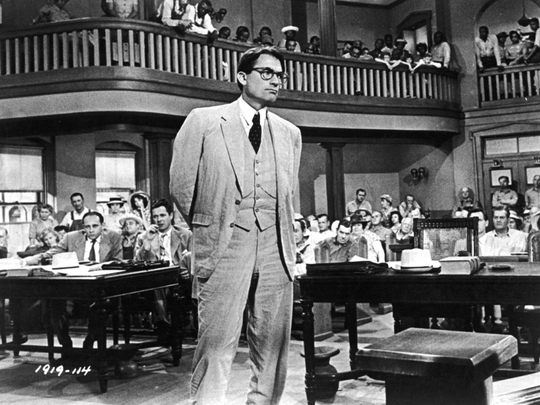
Law is the profession of rectitude. Its practitioners are buttoned-up, suit-wearing sesquipedalians, imprisoned by ethical rigour and circumlocution, unable to do anything unless it’s by the book - right? Not so fast. Some of us are less Atticus Finch, more Dr Gonzo, and the reason is simple: the idea that the law is black and white is a falsity. The law is like life - full of grey areas, disputes, conflict and uncertainty. It does its best to cope with the flux of human interaction, but often fails, and its practitioners prove to be as prone to bad behaviour as everybody else.
Literature has a habit of stereotyping lawyers, but some writers look for the lawyers who usurp convention, who don’t fit into our preconceived notions of what they should be and how they should behave. My main character in Flack’s Last Shift is a lawyer who seems to fit the mould, but longs to break it - rather like many lawyers I know.
And much as I like Atticus, the ethically unchallenged defence counsel and hero of Harper Lee’s To Kill a Mockingbird, I think literature’s most memorable lawyers are the morally compromised, the guilty-as-charged, the ineffectual and the damned. Here are my top 10, including - yes, it’s true - two who are actually quite nice.
1. Dr Gonzo in Fear and Loathing in Las Vegas by Hunter S Thompson
One of the high priests of new journalism, Thompson set a lawyer at the heart of this, his most famous book. Dr Gonzo is one of two protagonists in a drug-fuelled mission to report on the Mint 400, a desert race near Las Vegas. Based on Oscar “Zeta” Acosta, a well-known American attorney, Dr Gonzo alternately hallucinates, crashes cars and smashes hotel rooms, emerging as “hell on wheels in a bar brawl” and capable of ingesting just about every illegal substance known.
2. Herr Huld in The Trial by Franz Kafka
The Trial’s main character, Joseph K, is arrested but never told for what alleged offence. Despite K’s tireless quest for justice, access to “the law” proves to be impossible, in part because his own lawyer, Herr Huld, is so useless. For all his insistence that courtroom connections are of greater value than drafting K’s defence petition, Huld’s place of work - his bed - sums up his indolence.
3. Captain Vere in Billy Budd, Sailor by Herman Melville
Here’s a curio. Vere, skipper of HMS Bellipotent, is not actually a lawyer. But while on the high seas he is invested with legal authority, and seizes it all too willingly when confronted by Billy’s killing of John Claggart, the ship’s master-at-arms. Vere convenes a court martial and adroitly switches roles, one minute judge, the next prosecutor, then acting for the defence and even appearing as a witness. The morally innocent Billy is executed. Vere’s jurisprudential elasticity plays on his mind until his own death.
4. Emma Zunz in Emma Zunz by Jorges Luis Borges
OK, this a bit leftfield, but Borges was a great one for writing about what isn’t there - and while this tale of vengeance leaves the conventional apparatus of the law off the page, justice is nevertheless its key theme. Emma, convinced that her employer is responsible for her father’s death, goes to extraordinary lengths to ensure his demise, even sleeping with a stranger so that she can allege that her boss assaulted her. Her ensuing act of bogus self-defence leaves her vindicated and yet ashamed - and this strange, slight tale leaves us, as readers, wondering if “justice” is somehow always compromised.
5. Tulkinghorn in Bleak House by Charles Dickens
Back to the law as we know and do not love it. Bleak House gave us the case of Jarndyce v Jarndyce, a byword for legal prolixity: “Jarndyce and Jarndyce drones on. This scarecrow of a suit has, in course of time, become so complicated, that no man alive knows what it means.” Dickens’s fictional dispute over an estate “drags its dreary length before the court, perennially hopeless” until there is nothing of the estate left. The novel’s scheming lawyer, Tulkinghorn, stops at nothing in service of his client, Sir Leicester Dedlock. Bribery, blackmail, even abduction - all are par for the course, because he is irreducibly evil. No doubt Dickens enjoyed killing him off.
6. Quinn in Travels in the Scriptorium by Paul Auster
It’s not one of Auster’s best works but Travels in the Scriptorium is notable for the metamorphosis of Quinn, a character in his superb New York Trilogy, from private detective to lawyer. Mr Blank, a typical Auster figure, sits alone in a room, with not much more than a strange manuscript to keep him company. As if lawyers can help, soon enough he asks to see his attorney. “Don’t you recognise me?” says the lawyer, when he turns up. “I was your first operative. I’m Quinn.” Woe betide anyone whose lawyer says he’s an “operative”.
7. Guillaumin in Madame Bovary by Gustave Flaubert
Spare a thought for Emma Bovary. Married to the desperately dull Dr Bovary, she relies on the staple source of escape from the quotidian - the affair. A few affairs, in fact. They lead to her downfall but, worse, when she seeks help from Guillaumin, a lawyer, he is nothing but a shark in wolf’s clothing.
8. Sandor Himmelstein in Herzog by Saul Bellow
Here’s another tricky customer. Sandor Himmelstein is the lawyer to Moses E Herzog, Bellow’s eponymous protagonist. Herzog is going through a divorce, but staying with Himmelstein doesn’t do him any favours. He’s bullied by the lawyer, who despises Herzog’s emotional response to the world and merrily declares of his profession: “We’re all whores.” There are various morals in Herzog; one might be to never, ever stay with your lawyer.
9. Casi in A Naked Singularity by Sergio De La Pava
De La Pava’s wild and sprawling depiction of the bewildering work of a New York public defender amassed nearly 90 rejections before the author, himself a lawyer , decided to self-publish. His novel went on to become a publishing sensation. Its lead character is Casi, a young lawyer who wins every case he takes, until he is persuaded by a fellow lawyer to steal some drug money. Even as Casi crosses moral, ethical and legal lines, he can’t stop worrying about his clients and the criminals he’s robbing. His pledge that “nothing detrimental or untoward would ever happen to a client of mine” remains intact; the novel is hysterical, surreal, moving and wonderful.
10. Don Sebastiano in The Day of Judgment by Salvatore Satta
This beautiful, elegant and haunting book was published posthumously in 1979. Early 20th-century life in the Sardinian town of Nuoro is seen through the eyes of local lawyer Don Sebastiano. “His vocation was orderliness, which is the basis of creation,” writes Satta. “Accordingly, when a letter came, he would turn it over in his hands for a long time, gazing at it meditatively; then he would put it away in a file without opening it, because everything had its own time.”
— guardian.co.uk (c) Guardian News & Media Ltd, 2016








